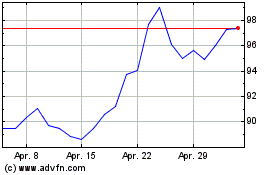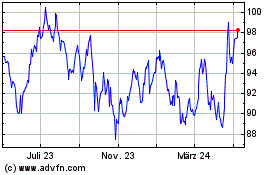The new biodiversity and water ambitions are
introduced in a dedicated report that outlines PMI's approach to
preserve nature, building on its 2025 Roadmap
As world leaders gather at the UN Biodiversity Conference
(COP15), Philip Morris International (PMI) (NYSE: PM) is proud to
announce ambitions that align with the Post-2020 Biodiversity
Framework.
The company’s new ambitions on biodiversity and water strengthen
PMI’s actions to address the environmental impacts of its business
operations, which it currently manages through two main strategies:
Tackle Climate Change and Preserve Nature. PMI intentionally structured the
new ambitions to maximize their impact around a 10-year span, from
2023 to 2033.
Detailing its strategy to Tackle Climate Change, PMI’s 2021
Low-Carbon Transition Plan brought forward the company’s ambitions
to achieve carbon neutrality in its direct operations (scopes 1+2)
by 2025, and to achieve carbon neutrality across its entire value
chain (scopes 1+2+3) by 2040. In addition, it introduced a new goal
for the company’s critical suppliers to adopt science-based targets
(SBTs) by 2025, in line with the SBTs to which PMI has already
committed.
To Preserve Nature, the company published its 2020 Zero Deforestation Manifesto, achieved zero gross
deforestation of primary and protected forests, and is working
towards achieving zero net deforestation of managed natural forests
and having a net positive impact on forests associated with the
tobacco supply chain by 2025. In its paper and pulp-based materials
supply chain, the company targets zero gross deforestation of
primary and protected forests by 2025, as well as zero net
deforestation of managed natural forests and no conversion of
natural ecosystems by 2030.
Perfect Forest™ PMI is pleased to be at the forefront of
promoting the sustainable management of forests and is encouraged
that respected stakeholders recognize the importance of what the
company is doing. Perfect Forest™ is the name of PMI’s operating
nature-based solutions (NbS) projects to preserve forest resources.
PMI believes that a constant effort at the landscape level is key
in transforming the relationship the company has with forest
ecosystems and local stakeholders, where “perfection” is the mutual
contribution between the protection of nature and the resulting
ecosystem services generated by it. In particular, Perfect Forest™
generates carbon sequestration, enhancing the potential of forestry
systems to deliver sustainable forest products and social benefits.
It also creates the conditions for protecting water resources,
balancing soil elements, and preserving natural habitats—key to
supporting biodiversity.
PMI’s New Ambitions to Preserve Nature Biodiversity
- Protect nature by achieving no net loss on ecosystems connected
to PMI’s value chain by 2033
- Contribute towards a net positive impact on nature by 2050
Water stewardship
- Scale solutions towards a positive impact on water resources,
measured as volume of water optimized and restored, by 2033
- Contribute towards a positive impact on water resources by
2050
“As our new ambitions demonstrate, PMI understands that
decarbonization, biodiversity protection, forestry management, and
water stewardship are deeply connected. We aspire to lead by
example in the responsible and sustainable management of natural
resources that can allow the promotion and protection of natural
ecosystems,” said Jennifer Motles, Chief Sustainability Officer.
“It is important to recognize the linkages between biodiversity
loss and vulnerability to climate change, and how these could
exacerbate poverty and inequality. Adaptation strategies that
promote the protection, preservation, and efficient use of natural
resources help us build preparedness to manage potential
environmental impacts that could affect our business.”
PMI’s strategies to Tackle Climate Change and Preserve Nature
have been recognized by CDP, a not-for-profit charity that runs a
global disclosure system for investors, companies, cities, and
regions to manage their environmental impacts. As of Dec. 13, 2022,
PMI has been honored with the Triple A score for its efforts across
climate, forests, and water stewardship. The ranking places PMI
among one in 1,000 companies worldwide to achieve the prestigious
Triple A score and among the world's most pioneering companies
leading on environmental transparency and performance.
“Natural capital is a wealth we all share and depend on. It is
essential that we do our part to protect, sustainably manage, and
nurture it—and we’re proud that CDP has once again recognized PMI’s
efforts to do exactly that,” explained Massimo Andolina, SVP,
Operations. “Further, preserving natural ecosystems by properly
managing land and water resources helps increase the resilience of
our production systems and reduce operational risks.”
Through its Integrated Report and CDP submissions, PMI seeks to
align with and is proud to support the Task Force on
Climate-Related Financial Disclosures (TCFD). Also reflected in the
company’s Triple A rating from CDP are PMI’s contributions to the
development of the parallel Task Force on Nature-Related Financial
Disclosures (TNFD). TNFD centers on the importance of protecting
ecosystems and promoting biodiversity. It states that its mission
is, in part, “to develop and deliver a risk management and
disclosure framework for organizations to report and act on
evolving nature-related risks.”
Visit pmi.com/sustainability for more information and read PMI’s
dedicated disclosure focused on Preserve Nature, published today.
To learn more about PMI’s overall approach to sustainability,
please refer to its latest Integrated Report 2021.
Philip Morris International: Delivering a Smoke-Free
Future Philip Morris International (PMI) is a leading
international tobacco company working to deliver a smoke-free
future and evolving its portfolio for the long term to include
products outside of the tobacco and nicotine sector. The company’s
current product portfolio primarily consists of cigarettes and
smoke-free products, including heat-not-burn, vapor and oral
nicotine products, which are sold in markets outside the U.S. Since
2008, PMI has invested more than USD 9 billion to develop,
scientifically substantiate and commercialize innovative smoke-free
products for adults who would otherwise continue to smoke, with the
goal of completely ending the sale of cigarettes. This includes the
building of world-class scientific assessment capabilities, notably
in the areas of pre-clinical systems toxicology, clinical and
behavioral research, as well as post-market studies. The U.S. Food
and Drug Administration (FDA) has authorized the marketing of
versions of PMI’s IQOS Platform 1 devices and consumables as a
Modified Risk Tobacco Products (MRTPs), finding that an exposure
modification orders for these products are appropriate to promote
the public health. As of September 30, 2022, excluding Russia and
Ukraine, PMI's smoke-free products are available for sale in 70
markets, and PMI estimates that approximately 13.5 million adults
around the world had already switched to IQOS and stopped smoking.
With a strong foundation and significant expertise in life
sciences, in February 2021, PMI announced its ambition to expand
into wellness and healthcare areas and deliver innovative products
and solutions that aim to address unmet consumer and patient needs.
For more information, please visit www.pmi.com and
www.pmiscience.com.
Forward-Looking and Cautionary Statements This press
release contains projections of future results and goals and other
forward-looking statements, including statements regarding
operational plans and strategies. Achievement of future results is
subject to risks, uncertainties and inaccurate assumptions. In the
event that risks or uncertainties materialize, or underlying
assumptions prove inaccurate, actual results could vary materially
from those contained in such forward-looking statements. Pursuant
to the “safe harbor” provisions of the Private Securities
Litigation Reform Act of 1995, PMI is identifying important factors
that, individually or in the aggregate, could cause actual results
and outcomes to differ materially from those contained in any
forward-looking statements made by PMI.
PMI's business risks include: excise tax increases and
discriminatory tax structures; increasing marketing and regulatory
restrictions that could reduce our competitiveness, eliminate our
ability to communicate with adult consumers, or ban certain of our
products in certain markets or countries; health concerns relating
to the use of tobacco and other nicotine-containing products and
exposure to environmental tobacco smoke; litigation related to
tobacco use and intellectual property; intense competition; the
effects of global and individual country economic, regulatory and
political developments, natural disasters and conflicts; the impact
and consequences of Russia's invasion of Ukraine; changes in adult
smoker behavior; the impact of COVID-19 on PMI's business; lost
revenues as a result of counterfeiting, contraband and cross-border
purchases; governmental investigations; unfavorable currency
exchange rates and currency devaluations, and limitations on the
ability to repatriate funds; adverse changes in applicable
corporate tax laws; adverse changes in the cost, availability, and
quality of tobacco and other agricultural products and raw
materials, as well as components and materials for our electronic
devices; and the integrity of its information systems and
effectiveness of its data privacy policies. PMI's future
profitability may also be adversely affected should it be
unsuccessful in its attempts to produce and commercialize
reduced-risk products or if regulation or taxation do not
differentiate between such products and cigarettes; if it is unable
to successfully introduce new products, promote brand equity, enter
new markets or improve its margins through increased prices and
productivity gains; if it is unable to expand its brand portfolio
internally or through acquisitions and the development of strategic
business relationships; or if it is unable to attract and retain
the best global talent, including women or diverse candidates.
Future results are also subject to the lower predictability of our
reduced-risk product category's performance.
In addition, important factors that could cause actual results
to differ materially from those indicated by forward-looking
statements include risks and uncertainties related to: the
agreement with Altria and the benefits of the transaction; the
possibility that expected benefits related to recent or pending
acquisitions, including the transaction with Swedish Match, may not
materialize as expected; the proposed transaction with Swedish
Match not being timely completed; Swedish Match’s business
experiencing disruptions due to transaction-related uncertainty or
other factors making it more difficult to maintain relationships
with employees, customers, licensees, other business partners or
governmental entities; difficulty retaining key Swedish Match
employees; the outcome of any legal proceedings related to the
proposed transaction with Swedish Match; and the parties being
unable to successfully implement integration strategies or to
achieve expected synergies and operating efficiencies within the
expected time-frames or at all.
PMI is further subject to other risks detailed from time to time
in its publicly filed documents, including PMI's Annual Report on
Form 10-K for the fourth quarter and year ended December 31, 2021
and the Form 10-Q for the quarter ended September 30, 2022. PMI
cautions that the foregoing list of important factors is not a
complete discussion of all potential risks and uncertainties. PMI
does not undertake to update any forward-looking statement that it
may make from time to time, except in the normal course of its
public disclosure obligations.
# # #
View source
version on businesswire.com: https://www.businesswire.com/news/home/20221214005553/en/
Philip Morris International David Fraser T. +41 (0)58 242 4500
E. david.fraser@pmi.com
Philip Morris (NYSE:PM)
Historical Stock Chart
Von Mär 2024 bis Apr 2024

Philip Morris (NYSE:PM)
Historical Stock Chart
Von Apr 2023 bis Apr 2024
